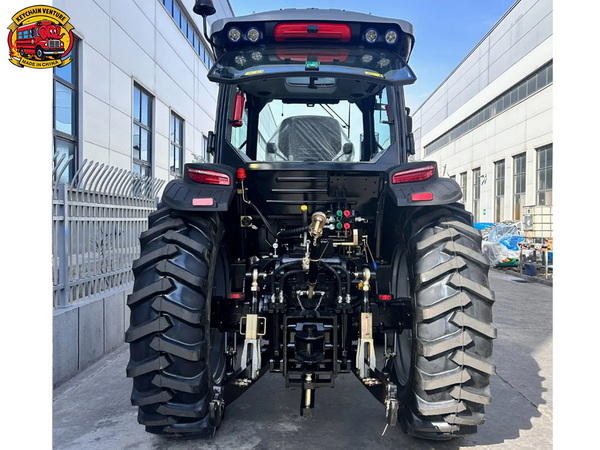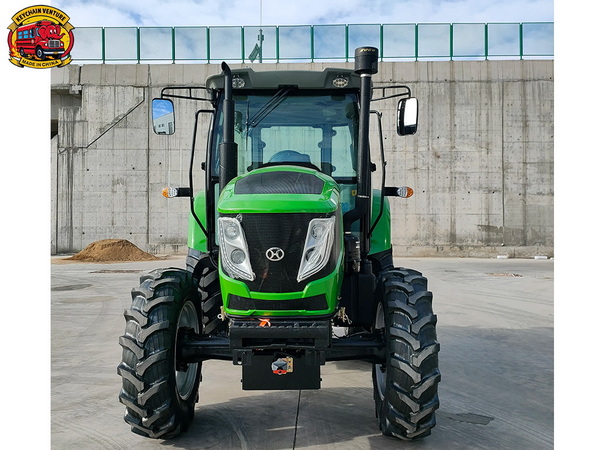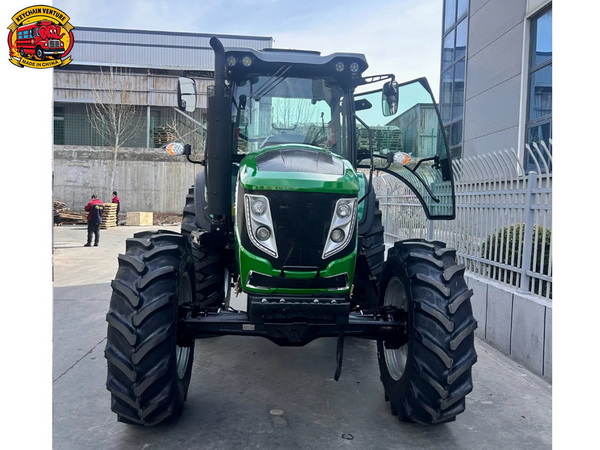Views: 222 Author: Amanda Publish Time: 2025-10-12 Origin: Site








Content Menu
● Legal Overview: Can Tractors Be Driven on Public Roads?
● Specific Country Regulations
>> Europe
>> New Zealand
● Tractor Road Safety Regulations
● Operator Licensing Requirements
● Roads Where Tractors Are Typically Restricted
● Additional Considerations for Tractor Road Use
>> Environmental and Noise Regulations
>> Seasonal and Temporary Permissions
>> Tractor Size and Load Restrictions
● Frequently Asked Questions (FAQ)
>> 1. What is the minimum age to drive a tractor on public roads?
>> 2. Are tractors allowed on highways or motorways?
>> 3. What safety equipment must a tractor have on public roads?
>> 4. Do I need a special license to drive a tractor?
>> 5. Can I drive a tractor on the road at night?
Tractors have long been a symbol of agriculture and rural life, essential for farming operations worldwide. However, when it comes to driving these powerful machines on public roads, many wonder: is it legal to drive a tractor on the road? The answer is yes—but with a variety of laws, regulations, and safety considerations that differ by country and region. This article provides an in-depth exploration of tractor road legality, the conditions under which these machines can be driven, and key safety requirements for both operators and other road users.

A tractor is a motor vehicle specifically designed to provide high torque at low speeds, primarily used to pull or push agricultural implements. Modern tractors may also have attachments for various farm tasks, including plowing, planting, harvesting, and hauling heavy loads over farmland. While their prime environment is off-road on farms, situations often arise where tractors need to traverse public roads to reach other fields or transport equipment.
In virtually every country, tractors are allowed on roads but under regulated conditions. The core reasoning is that tractors frequently need to move between plots of land via public infrastructure, especially in agricultural regions where farms are dispersed.
- Tractors typically have fewer registration and title requirements compared to passenger vehicles.
- Most laws require tractors to be roadworthy, equipped with specific lighting and markings suitable for slow-moving vehicles.
- Drivers must possess relevant licenses or permits, often dependent on tractor type, weight, or speed capability.
- Tractors are generally subject to speed limits much lower than those for cars and trucks.
- Restrictions may apply on certain roads, including prohibitions on highways and expressways.
In the US, tractors are legal on public roads with the following points:
- Tractors often do not require standard vehicle titles or registrations as they are classified as farm equipment.
- Tractors typically move slower than 25 mph and must display a Slow-Moving Vehicle (SMV) emblem (a reflective orange triangle).
- State laws vary, but common requirements include front white lights, rear red reflectors or lights visible from 500 feet, and sometimes flashing amber beacons.
- Drivers must share the road responsibly, never overtaking tractors in no-passing zones, and must respect tractor turns and wide implements on rural highways.
- Driving tractors on public roads at night is restricted in some states due to safety concerns.
- Tractor operators should check insurance coverage to ensure it covers road use.
European countries have detailed legal frameworks governing tractor road use that often share common elements but vary in licensing, speed limits, and safety equipment.
- United Kingdom: Drivers need a Category F license (or obtain it automatically with Category B car license), and tractors are capped at 20 mph on roads. Registration, insurance, and compliance with lighting standards are mandatory.
- Germany: Strict compliance with vehicle inspections, registration, and licensing. Speed limits typically about 25 km/h, with requirements for specific lighting and reflective panels.
- France: Agricultural tractors require registration and insurance. Drivers need licenses depending on speed capability, with seasonal permits during harvests. Strict lighting and load limits apply.
- Spain: Regional variations exist; generally, tractors are registered and insured, with speed limits of 40 km/h and restrictions on usage during peak traffic.
- Poland & Portugal: Mandatory use of reflective triangles and lighting, insurance, registration, and valid driving licenses are standard.
- Operators must have at least a Class 1 driver license (car license).
- Tractors driving on roads at speeds over 40 km/h require a Warrant of Fitness (WoF).
- Safety requirements mandate appropriate lighting and obeying road rules similar to other vehicles.
Operating a tractor on a public road poses unique challenges. Tractors are slow-moving, heavy, and sometimes wide vehicles that can cause hazards if not used cautiously. Therefore, tractor operators and other road users must follow safety guidelines:
- Use slow-moving vehicle signs—fluorescent red-orange reflective triangles—to warn following traffic.
- Ensure tractors have front white lights, rear red lights or reflectors visible up to 500 feet.
- Equip tractors with flashing amber beacons, especially in low visibility or at night if legal.
- Avoid driving after dark unless absolutely necessary and well-lit.
- Always signal turns and stops; use hand signals if lights are not available.
- Occupy entire traffic lanes—do not drive partially on shoulders, which can confuse motorists.
- Pull over safely to allow faster vehicles to pass.
- Do not allow unauthorized passengers on tractor seats or towed implements.
- Avoid freewheeling downhill; use appropriate gears for control.
- Detailed safety instructions should be included in tractor operator manuals.

Licensing varies depending on the country and the tractor's characteristics:
- In the UK, a Category F license is required, which is bundled automatically with a standard car license (Category B).
- Some countries require specific tests for agricultural machinery operation.
- Minimum age restrictions for tractor driving vary, with some allowing younger drivers under supervision and training.
- Other agricultural vehicles like telehandlers and sprayers may have different licensing conditions.
- Tractors are generally prohibited on motorways, expressways, and roads with high-speed limits.
- Some regions restrict tractors on roads during peak traffic or at night.
- Special signs may indicate roads where slow-moving agricultural vehicles are banned.
- Operators should consult local traffic laws before road use.
Insurance requirements vary, but it is generally advisable for tractor operators to carry proper insurance covering road use to protect against liability. Tractor accidents on public roads can result in property damage, injury, or even fatalities, so coverage is critical for financial and legal protection.
Some localities impose limits on emissions and noise for tractors operating on roads, particularly near urban or residential areas. These environmental laws help reduce pollution and disturbance caused by older or louder agricultural machinery traveling on public routes.
In many agricultural regions, temporary permits may be issued during planting or harvest seasons allowing more frequent or longer-distance tractor travel on certain roads. These permits ensure that farmers can complete their work without penalty while maintaining road safety protocols.
Road regulations often include specifications on the maximum dimensions and loads allowed for tractors and their attachments while on public roads. Oversized or overweight equipment may require escort vehicles or special permits.
Driving tractors on public roads is legal in most jurisdictions, but it comes with strict rules and safety regulations designed to protect both tractor operators and other motorists. Operators must ensure their tractors are properly equipped with required lighting and markings, adhere to speed limits, and possess the appropriate license. Sharing the road responsibly and understanding regional laws can significantly reduce risks and improve safety for all. As agriculture modernizes and tractors become even more visible on roads, awareness of these rules is essential.

Age requirements vary by country. In many places, operators must be at least 16 years old with relevant licenses and training. Some regions allow younger operators under supervision for farm work.
Generally, tractors are prohibited from highways and motorways due to their slow speed and size. They are mainly allowed on rural and local roads where their presence is expected safely.
Tractors must display Slow-Moving Vehicle (SMV) emblems, have front white lights, rear red lights or reflectors visible from a distance, and often flashing amber beacons. Safety flags and hand signals are also common requirements.
Licensing depends on country laws. In the UK, a Category F license or a standard car license with Category F entitlement is required. Other countries may require specialized tests or driver education specific to tractors.
Some regions restrict driving tractors on public roads after dark for safety reasons, while others allow it with proper lighting and reflective equipment. Operators should follow local laws and prioritize visibility.